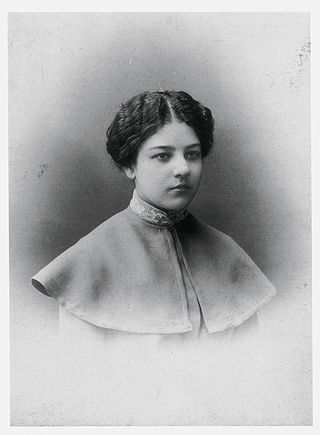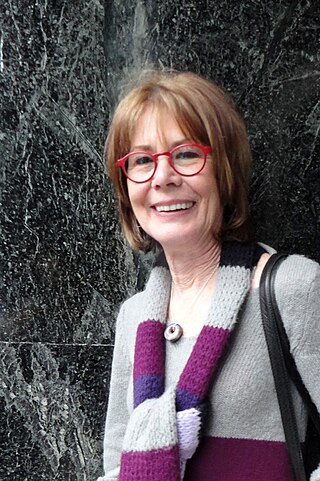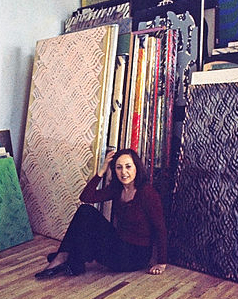
Olga Vladimirovna Rozanova was a Russian avant-garde artist painting in the styles of Suprematism, Neo-Primitivism, and Cubo-Futurism.

Alice Bailly was a Swiss avant-garde painter, known for her interpretations on cubism, fauvism, futurism, her wool paintings, and her participation in the Dada movement. In 1906, Bailly had settled in Paris where she befriended Juan Gris, Francis Picabia, and Marie Laurencin, avant-garde modernist painters who influenced her works and her later life.
Antoinette Fouque was a French psychoanalyst who was involved in the French women's liberation movement. She was the leader of one of the groups that originally formed the French Women's Liberation (MLF), and she later registered the trademark MLF specifically under her name. She helped found the publishing house Éditions des Femmes as well as the first collection of audio-books in France, "Bibliothèque des voix". Her position in feminist theory was primarily essentialist, and heavily based in psychoanalysis. She helped author Le Dictionnaire universel des créatrices (2013), a biographical dictionary about creative women.

Suzy Lake is an American-Canadian artist based in Toronto, Canada, who is known for her work as a photographer, performance artist and video producer. Using a range of media, Lake explores topics including identity, beauty, gender and aging. She is regarded as a pioneering feminist artist and a staunch political activist.

Carla Accardi was an Italian abstract painter associated with the Arte Informel and Arte Povera movements, and a founding member of the Italian art groups Forma (1947) and Continuità (1961).
Annegret Soltau is a German visual artist, born in Lüneburg, Germany.

Renate Bertlmann is a leading Austrian feminist avant-garde visual artist, who since the early 1970s has focused on issues surrounding themes of sexuality, love, gender and eroticism within a social context, with her own body often serving as the artistic medium. Her diverse practice spans across painting, drawing, collage, photography, sculpture and performance, and actively confronts the social stereotypes assigned to masculine and feminine behaviours and relationships.
Mary Beth Edelson was an American artist and pioneer of the feminist art movement, deemed one of the notable "first-generation feminist artists." Edelson was a printmaker, book artist, collage artist, painter, photographer, performance artist, and author. Her works have been shown at the Museum of Modern Art, the Smithsonian American Art Museum, and the Museum of Contemporary Art in Chicago.
Stella F. Simon was an American photographer, director and cinematographer who worked in both Germany and the United States. In 1928, she finished her only film, Hands: The Life and Love of a Gentle Sex, which is an avant-garde feminist film with imagery drawn from Europe and North America.

Birgit Jürgenssen (1949–2003) was an Austrian photographer, painter, graphic artist, curator and teacher who specialized in feminine body art with self-portraits and photo series, which have revealed a sequence of events related to the daily social life of a woman in its various forms including an atmosphere of shocking fear and common prejudices. She was acclaimed as one of the "outstanding international representatives of the feminist avant-garde". She lived in Vienna. Apart from holding solo exhibitions of her photographic and other art works, she also taught at the University of Applied Arts Vienna and the Academy of Fine Arts Vienna.
Emma Baeri is a Sicilian feminist historian and essayist. She has played an active role in organizing feminist political action and literary life in Italy along with her academic career.

Margot Pilz is an Austrian visual artist and a pioneer of conceptual and digital art in Austria. She was one of the first Austrian artists to combine computers and photography. Her works reflect the avant-garde culture of the 1960s and 1970s in their experimental techniques and performative aspects. Her work received renewed attention in the 2010s.

Lina Mangiacapre was an Italian feminist playwright and filmmaker.
Maria Rosa Cutrufelli is an Italian writer and journalist.

Luciana Percovich is an Italian non-fiction writer, a teacher, a translator and director of a series of books on women’s history and spirituality. She was born in Gorizia, Italy in a Mitteleuropean Italian speaking family forced to leave Fiume, Rijeka at the end of World War II, with cultural and geographical roots in Austria and Dalmatia, she spent her childhood and adolescence in Gorizia attending Classical studies. At the age of 18, she went to Milan to complete her education, and there she graduated in 1972. She has been defined as "a traveller between worlds and a weaver of space-time connections for her ability of embracing distant wide horizons with a loving insight".
Whatever I've done, it's been conceived within women's relations, in presence of women's bodies and in the flowing of awakened women's emotions.
Feminist Avantgarde: Art of the 1970s is an international series of exhibitions and a book publication curated and edited by the Austrian art historian Gabriele Schor about feminist art in the second half of the twentieth century.
The Rivolta Femminile refers to: the first female-only feminist group, created in Rome in 1970 with a meeting between Carla Lonzi, Carla Accardi, and Elvira Banotti; the manifesto they developed, which appeared on the walls of Rome in July 1970, is "The Manifesto of Female Revolt"; the "Women's Revolt" publishing house, founded in 1970 in Milan by Carla Lonzi, through it the writings of the group were published.

Gabriele Schor, born in Vienna in 1961, is an Austrian writer, art critic and curator. She is a specialist of the feminist avantgarde of the 1970s.

Lotte Profohs, also Lotte Profohs-Leherb, was an Austrian graphic artist and painter who was close to Expressionism.

Karin Mack is an Austrian post-war photo artist, who belongs to the avant-garde feminist art of the 1970s. She is known primarily for generating her themes from very personal introspection and then presenting them as if "in a theater of self-events".












